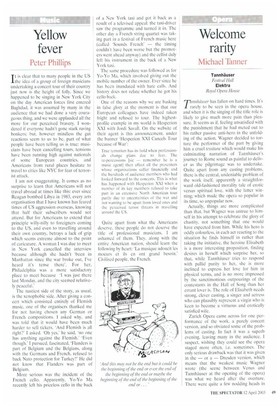Yellow fever
Peter Phillips
It is clear that to many people in the US the idea of a group of foreign musicians undertaking a concert tour of their country just now is the height of folly. Since we happened to be singing in New York City on the day American forces first entered Baghdad, it was assumed by many in the audience that we had done a very courageous thing, and we were applauded all the more for our perceived bravery. I wondered if everyone hadn't gone stark raving bonkers; but, however mindless the gut reactions seem to us to be, part of what people have been telling us is true: musicians have been cancelling tours, tensions have been running high against nationals of some European countries, and Americans from rural places hesitate to travel to cities like NYC for fear of terrorist attack.
I am not exaggerating. It comes as no surprise to learn that Americans will not travel abroad at times like this: ever since Reagan bombed Libya in 1983, every arts organisation that I have known has feared times of US aggression overseas, knowing that half their subscribers would not attend. But for Americans to extend that principle willy-nilly to foreigners coming to the US, and even to travelling around their own country, betrays a lack of grip which seems extreme almost to the point of caricature. A woman I was due to meet in New York cancelled the interview because although she hadn't 'been in Manhattan since the war broke out, I've heard it's tense there'. For her, Philadelphia was a more satisfactory place to meet because 'I was just there last Monday, and the city seemed relatively peaceful.'
The nastiest side of the story, as usual, is the xenophobic side. After giving a concert which consisted entirely of Flemish music, one of the organisers thanked me for not having chosen any German or French compositions. I asked why, and was told that it would have been much harder to sell tickets. And Flemish is all right?' I asked. 'Oh yes,' he said, 'no one has anything against the Flemish.' Even though,' I pursued, fascinated. 'Flanders is part of Belgium and the Belgians, along with the Germans and French, refused to back Nato protection for Turkey?' He did not know that Flanders was part of Belgium.
More serious was the incident of the French cello. Apparently, Yo-Yo Ma recently left his priceless cello in the back of a New York taxi and got it back as a result of a televised appeal: the taxi-driver saw the programme and turned it in. The other day a French string quartet was taking part in a festival of French music here (called 'Sounds French' — the timing couldn't have been worse but the promoters went ahead anyway) and the cellist duly left his instrument in the back of a New York taxi.
The same procedure was followed as for Yo-Yo Ma, which involved giving out the mobile number of the owner. Ever since he has been inundated with hate calls. And history does not relate whether he got his cello back.
One of the reasons why we are basking in false glory at the moment is that our European colleagues have indeed taken fright and refused to tour. The highestprofile example in my world is Hesperion XXI with Jordi SavaII. On the website of their agent is this announcement, under the banner 'Hesperion XXI Cancels Tour because of War': True terrorism has its hold when professionals change plans due to fear. The re-percussions 'sic — remember he is a music agent] then affect all the presenters whose organisations suffer financially and the hundreds of audience members who had looked forward to the concerts. This is what has happened with Hesperion XXI when a number of its key members refused to take part in an extensive North American tour partly due to uncertainties of the war and not wanting to be apart from loved ones and the perceived terror threats in travelling around the US.
Quite apart from what the Americans deserve, these people do not deserve the title of professional musicians. I am ashamed of them. They, along with the entire American nation, should learn the following by heart: 'La musique adoucit les moeurs et ils en ant grand besoin.' Civilised people, the French.


































































 Previous page
Previous page